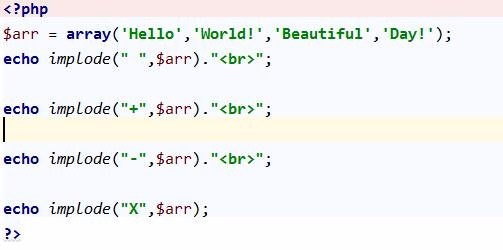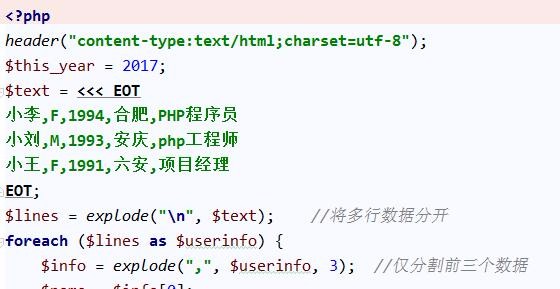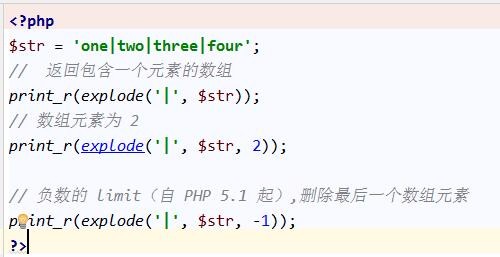Home >Backend Development >PHP Tutorial >Recommended 10 articles about explode
Recommended 10 articles about explode
- 怪我咯Original
- 2017-06-13 11:06:041184browse
Split the string The splitting of the string is achieved through the explode() function. The explode() function splits a string according to the specified rules, and the return value is an array. The grammar format is as follows: the parameter list of the Explode (SEPAROR, String, Limit) function is as follows: paraparator's necessary parameters, specify the segmentation identifier. string required parameter, specifies the string to be split limit optional parameter, specifies the number of array elements returned Note: if separator is an empty string (" "), explode() will return false; if separator contains The value cannot be found in string, then the explode() function will return an array containing a single element of string. If the limit parameter is set, the returned array contains at most limit elements, and the last element will contain the remainder of the string; if the limit parameter is a negative number, all but the last -lim
1 are returned. 10 recommended articles about explode

##Introduction: Splitting a string The splitting of a string is This is achieved through the explode() function. The explode() function splits a string according to the specified rules, and the return value is an array. The syntax format is as follows: The parameter list of the explode(separator, string, limit) function is as follows: Parameters string required parameter, specify the string to be split limit optional...
2. Detailed introduction to compound words

This profile: The segmentation of the split string string is implemented by the Explode () function. The explode() function splits a string according to the specified rules, and the return value is an array. The syntax format is as follows: The parameter list of the explode(separator, string, limit) function is as follows: Parameters string required parameter, specify the string to be split limit optional...
3. 10 recommended articles about the php explode() function

Introduction: The example in this article describes how PHP obtains the number of days in the current month and the date array based on the year and month. Share it with everyone for your reference, the details are as follows: function get_day( $date ) { $tem = explode('-' , $date); //
##4. Recommended 10 articles about the php in_array() function

Introduction: The example in this article describes how PHP obtains the number of days in the current month and the date array based on the year and month. Share it for everyone for your reference. The specifics are as follows: Function & nbsp; get_day (& nbsp; $ date & nbsp;) & nbsp; & nbsp; {& nbsp; & nbsp; & nbsp; & nbsp; Explode ('-' , $date); //
5. Some usage summary of php implode() function

Introduction: The implode() function in PHP returns a string composed of array elements, which is the opposite of the PHP explode() function. The php explode() function is: use one string to split another string and return an array composed of strings. This article found several articles about the php implode() function. I hope it will be helpful for everyone to understand the php implode() function.
6. php explode() function usage summary

Introduction: In PHP, the explode() function splits a string into an array. Its return value is an array composed of strings, each element of which is a substring separated by separator as a boundary point. This article summarizes some articles about the php explode() function. I hope it will be helpful for everyone to learn the php explode() function.
7. The difference between the usage of php implode() function and explode() function

Introduction: The explode() function in PHP is: use one string to split another string and return an array composed of strings. The implode() function returns a string composed of array elements. These two functions are the conversion functions between strings and arrays.
8. php implode() function example detailed explanation

##Introduction: The implode() function in php returns a string composed of array elements. It is opposite to the php explode() function. The php explode() function is: use one string to split another A string and returns an array of strings.
9. How to use the php explode() function

10.
php explode() function example detailed explanation

[Related Q&A recommendations]:
PHP namespace Problems with using built-in function names? How does php determine if a string contains Chinese commas? serializers - The data passed by ajax is a serialized string. Why does php accept the past as an array?php function parameters When there are too many, what is the efficiency if we use string instead? javascript - Why can't explode split spaces?
The above is the detailed content of Recommended 10 articles about explode. For more information, please follow other related articles on the PHP Chinese website!

